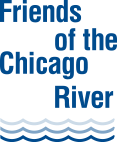Friends’ Planning Director Shares River Management Research at Chaddick Institute
 Friends' Adam Flickinger (second from right) with DePaul University professors.
Friends' Adam Flickinger (second from right) with DePaul University professors.
Flickinger, Friends’ planning director, recently presented new research at DePaul University’s Chaddick Institute for Metropolitan Development highlighting innovative approaches to managing and improving urban river corridors from across the country. His work offers key insights that can help Chicago prepare for the next phase of river investments and stewardship. This work was part of Adam’s 2024 Chaddick Institute River Fellowship.
Adam’s presentation and policy paper, developed in collaboration with Chaddick Institute researchers, examined case studies from four peer cities—Detroit, Milwaukee, New York City, and Saint Paul. This work is also closely tied to discussions being facilitated by Friends and the Metropolitan Planning Council with agency partners as part of the City of Chicago’s River Ecology and Governance Task Force, which is focused on cross organizational collaboration on river projects, plans, and policies. Each case study city examined offers lessons in how to structure, maintain, and fund river-focused initiatives that balance ecological restoration, economic development, and community access.
“Urban rivers systems are under increasing stress from aging infrastructure, more frequent extreme weather, and a rapidly growing public interest in recreational opportunities,” said Adam during his talk at the Chaddick Institute. “Chicago can learn a great deal from how other cities are approaching these shared challenges to prepare for the river’s future needs. Chicago’s river edge parks, trails, and ecosystems that were created in in the 1990’s are starting to require major maintenance investments, and at the same time, there is a need to restore and provide public access to areas of the riverfront that have not had the same amount of past attention. This will be the city’s challenge for the future.”
The research points to several common themes critical to successful river revitalization:
- Strategic governance structures that leverage the organizational strengths of non-profits, governments, and funds from multiple sources to build and maintain river infrastructure.
- Clear governance roles and responsibilities clearly defined responsibilities assigned to staff and agencies that are specifically tailored to river needs.
- Guiding vision plans initiatives have clear strategic action plans, focused on a defined river corridor district, that elevate environmental resilience while advancing economic and recreational goals.
Adam emphasized that the future of the Chicago-Calumet River system depends on a collaborative, inclusive approach that builds off of local community visions for the river corridor. His research findings contribute to a growing policy conversation around how Chicago and its partners can plan, fund, and manage the river’s next transformation.
The fellowship and research were supported by Dr. Joe Schwieterman and the team at the Chaddick Institute.
Read the full policy paper here: https://lnkd.in/gdgWpyxE

